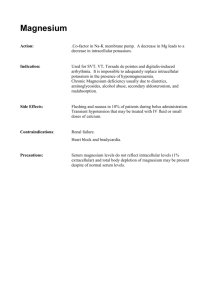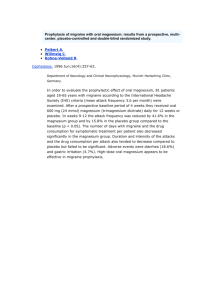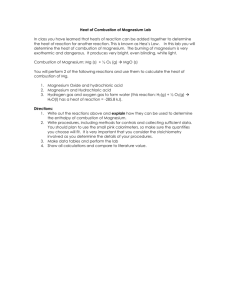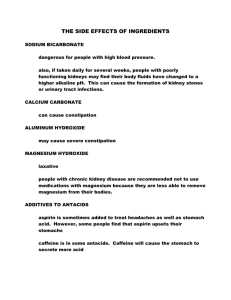ALCOHOLISM - George Eby Research Institute
advertisement
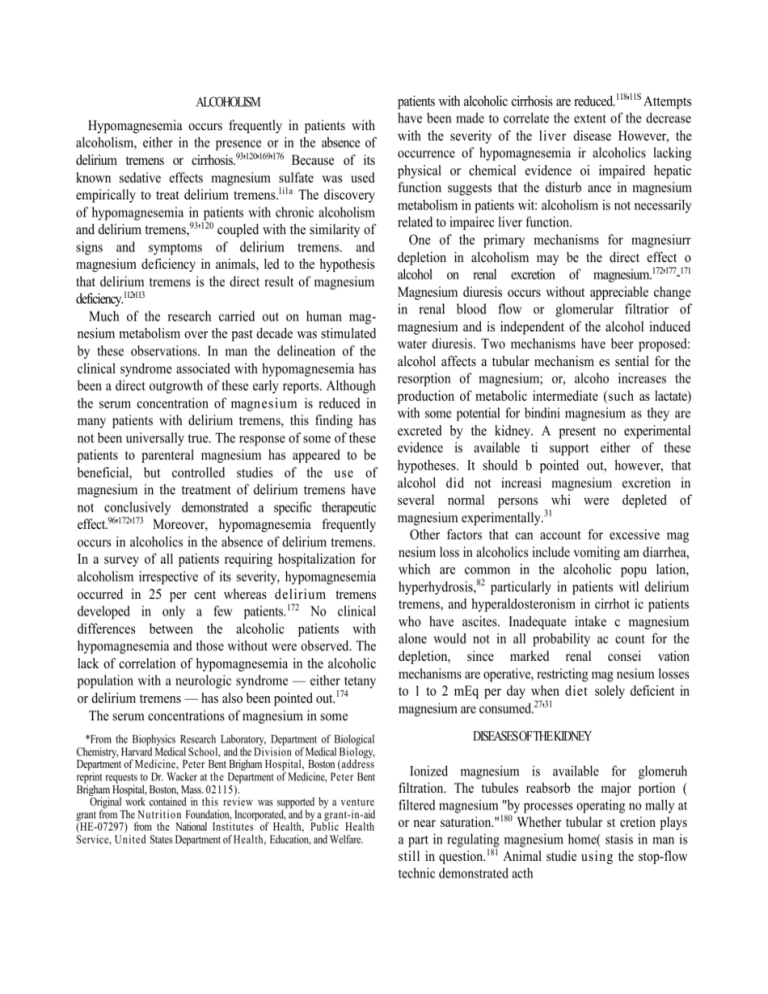
ALCOHOLISM Hypomagnesemia occurs frequently in patients with alcoholism, either in the presence or in the absence of delirium tremens or cirrhosis.93'120'169'176 Because of its known sedative effects magnesium sulfate was used empirically to treat delirium tremens.l i l a The discovery of hypomagnesemia in patients with chronic alcoholism and delirium tremens,93'120 coupled with the similarity of signs and symptoms of delirium tremens. and magnesium deficiency in animals, led to the hypothesis that delirium tremens is the direct result of magnesium deficiency.112'113 Much of the research carried out on human magnesium metabolism over the past decade was stimulated by these observations. In man the delineation of the clinical syndrome associated with hypomagnesemia has been a direct outgrowth of these early reports. Although the serum concentration of magnes ium is reduced in many patients with delirium tremens, this finding has not been universally true. The response of some of these patients to parenteral magnesium has appeared to be beneficial, but controlled studies of the use of magnesium in the treatment of delirium tremens have not conclusively demonstrated a specific therapeutic effect.96'172'173 Moreover, hypomagnesemia frequently occurs in alcoholics in the absence of delirium tremens. In a survey of all patients requiring hospitalization for alcoholism irrespective of its severity, hypomagnesemia occurred in 25 per cent whereas delirium tremens developed in only a few patients.172 No clinical differences between the alcoholic patients with hypomagnesemia and those without were observed. The lack of correlation of hypomagnesemia in the alcoholic population with a neurologic syndrome — either tetany or delirium tremens — has also been pointed out.174 The serum concentrations of magnesium in some *From the Biophysics Research Laboratory, Department of Biological Chemistry, Harvard Medical School, and the Division of Medical Biology, Department of Medicine, Peter Bent Brigham Hospital, Boston (address reprint requests to Dr. Wacker at the Department of Medicine, Peter Bent Brigham Hospital, Boston, Mass. 02115). Original work contained in this review was supported by a venture grant from The Nutrit ion Foundation, Incorporated, and by a grant-in-aid (HE-07297) from the National Institutes of Health, Public Health Service, United States Department of Health, Education, and Welfare. patients with alcoholic cirrhosis are reduced.118'11S Attempts have been made to correlate the extent of the decrease with the severity of the liver disease However, the occurrence of hypomagnesemia ir alcoholics lacking physical or chemical evidence oi impaired hepatic function suggests that the disturb ance in magnesium metabolism in patients wit: alcoholism is not necessarily related to impairec liver function. One of the primary mechanisms for magnesiurr depletion in alcoholism may be the direct effect o alcohol on renal excretion of magnesium.172'177-171 Magnesium diuresis occurs without appreciable change in renal blood flow or glomerular filtratior of magnesium and is independent of the alcohol induced water diuresis. Two mechanisms have beer proposed: alcohol affects a tubular mechanism es sential for the resorption of magnesium; or, alcoho increases the production of metabolic intermediate (such as lactate) with some potential for bindini magnesium as they are excreted by the kidney. A present no experimental evidence is available ti support either of these hypotheses. It should b pointed out, however, that alcohol did not increasi magnesium excretion in several normal persons whi were depleted of magnesium experimentally.31 Other factors that can account for excessive mag nesium loss in alcoholics include vomiting am diarrhea, which are common in the alcoholic popu lation, hyperhydrosis,82 particularly in patients witl delirium tremens, and hyperaldosteronism in cirrhot ic patients who have ascites. Inadequate intake c magnesium alone would not in all probability ac count for the depletion, since marked renal consei vation mechanisms are operative, restricting mag nesium losses to 1 to 2 mEq per day when diet solely deficient in magnesium are consumed.27'31 DISEASES OF THE KIDNEY Ionized magnesium is available for glomeruh filtration. The tubules reabsorb the major portion ( filtered magnesium "by processes operating no mally at or near saturation."180 Whether tubular st cretion plays a part in regulating magnesium home( stasis in man is still in question.181 Animal studie using the stop-flow technic demonstrated acth


